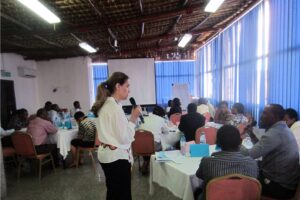The Prevention of Gender-Based Violence: An Improvement Perspective
By Elizabeth Romanoff Silva, MPA on November 25, 2013
Today marks the International Day for the Elimination of Violence Against Women. This day serves as the beginning of the 16 Days of Activism Against Gender-Based Violence Campaign, which is celebrated annually between November 25 and December 10, ending on International Human Rights Day. Gender-based violence (GBV) is violence directed at a woman, man, girl or boy based on that person’s sex, gender identity, or how that person meets or does not meet cultural norms of femininity or masculinity. Sexual, physical and psychological abuses are all forms of GBV. It encompasses a wide range of human rights abuses, including domestic violence (violence by a family member and intimate partner violence). Sexual violence is another form of GBV, and includes sexual abuse and rape, and forced prostitution. Human trafficking and harmful traditional practices, including child marriage, female infanticide, honor killings, female genital mutilation/cutting and dowry-related violence are also forms of GBV. It is important to remember that gender-based violence is not only a women’s issue, although girls and women are disproportionately affected by GBV. The WHO estimates that at least one in three women globally will be beaten, raped, or otherwise abused during her lifetime, and often it happens while she’s still a child herself. Yet men and boys are also subjected to GBV, and due to rigid gender norms in some parts of the world, men and boys can actually be less able to seek help as victims of GBV.
Two groups particularly susceptible to GBV are those in areas of conflict and development practitioners and health workers. In societies affected by war or civil unrest, violence is becoming the new “norm.” It is painful to witness the daily killings and abuse of innocent people and yet not enough efforts are made globally to address the effects of such violence on the wellbeing of the society. There is enough evidence demonstrating the effects of violence during war and civil unrest on GBV during periods of relative peace, however not enough funding is available to address such effects. There is so much hatred rooted at times of war among what seems like entire generations and GBV is becoming part of their daily lives. In Egypt, Syria, Tunisia, Libya and other countries going through political transition, women, men, girls and boys are subjected to violence every day, yet such cases are underreported and not properly addressed.
Addressing GBV among development practitioners and health workers is also extremely important. While they are often expected to identify and respond to GBV, the fact is that development practitioners and health workers are at an elevated risk for being affected by GBV themselves. This group can be subjected to violence in the home, by clients and providers, or by community members. It is necessary to identify best practices in GBV prevention and treatment methods among development practitioners and health workers in order to keep our own staff safe and address issues affecting performance. However, these are not the only groups vulnerable to GBV. Cases of violence against men and women, boys and girls with physical or mental challenges often pass unnoticed or are overlooked. The same applies to lesbian, gay, bisexual and transgender people.
We at WI-HER realize that the root cause of GBV is unequal power relations and traditional perceptions, including the perception of masculinity, which is sometimes accepted as the “norm.” The effects of GBV go further than just poor health outcomes for women, men, girls and boys; GBV thwarts development and prevents those affected from reaching their full human potential. For WI-HER, addressing GBV is central to all of our work in health, education, rule of law, and vulnerable children and families programming worldwide. We take a human rights approach to combating GBV and our first step in addressing GBV is to understand the local beliefs, cultural norms and the context in which the violence is occurring for us to be able to develop culturally-sensitive and relevant strategies to prevent and respond to GBV. We work to sensitize communities to the harmful effects of GBV on individuals and its detrimental impact on families and communities. This includes ensuring that women and girls, men and boys are actively involved in prevention efforts.
As a partner to the USAID Applying Science to Strengthen and Improve Systems (ASSIST) project, we integrate GBV prevention and response strategies into our Quality Improvement (QI) and systems strengthening work. Since preventing and responding to GBV is central to achieving our program outcomes, it is vital that development practitioners and community healthcare workers are sensitized to the causes and consequences of GBV in order to develop and implement appropriate strategies to prevent and treat GBV.
Below is a photo of WI-HER President and CEO Dr. Taroub Faramand conducting a gender integration training which included the topic of GBV in Dar es Salaam, Tanzania through the USAID ASSIST project in early 2013. Participants included staff from USAID ASSIST, the Tibu Homa Project and the Tanzania Commission for AIDS (TACAIDS).
